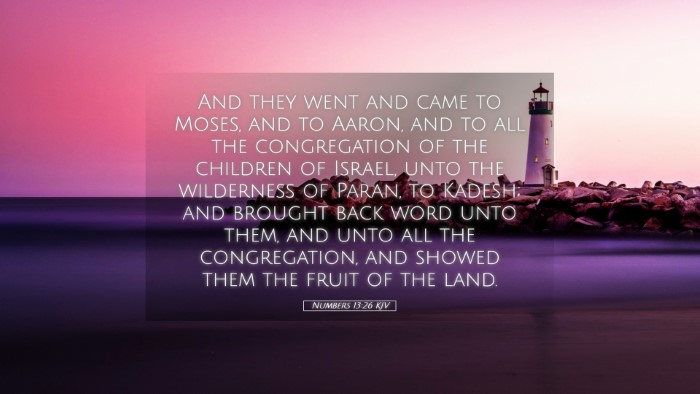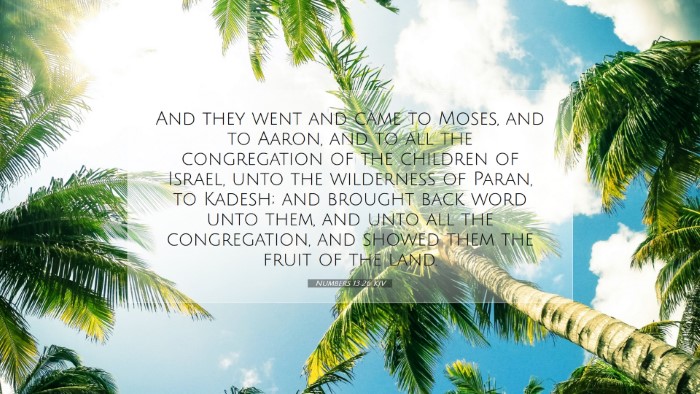Commentary on Numbers 13:26
Verse: Numbers 13:26 - "And they went and came to Moses, and to Aaron, and to all the congregation of the children of Israel, unto the wilderness of Paran, to Kadesh; and brought back word unto them, and unto all the congregation, and showed them the fruit of the land."
Contextual Overview
The book of Numbers details the journey of the Israelites through the wilderness following their exodus from Egypt. Numbers 13 marks a pivotal moment as God commands Moses to send spies into Canaan, the Promised Land. This event is crucial as it sets the stage for Israel's subsequent actions and attitudes toward God's promises. The verse in focus captures the return of the spies who were sent to explore the land flowing with milk and honey.
Summary of Insights
-
Matthew Henry:
Henry emphasizes the significance of this mission, noting that the spies were to verify God's promise regarding the land. Their subsequent report illustrates human tendencies toward doubt, contrasting divine assurance with fleshly apprehension. Henry highlights the fruits they brought back as a tangible testament to the land’s richness, which should have affirmed faith rather than incited fear.
-
Albert Barnes:
Barnes focuses on the organizational aspect of the mission. He notes the choice of leaders from each tribe, reflecting the importance of representation and togetherness in Israel's leadership. The return of the spies brought both excitement and fear, demonstrating the dichotomy between faith and sight. Barnes comments on how the physical evidence of the land's fertility (the fruit) should have encouraged the Israelites to trust in God's provision.
-
Adam Clarke:
Clarke delves into the implications of the spies' mission, highlighting the varied responses to their findings. He asserts that while the land was indeed fruitful, the perceptions of the inhabitants created doubt in the hearts of the people. Clarke stresses that despite their mixed assessment, God's promise remained unchanged. He also notes that the phrase “brought back word” signifies the importance of communication in the faith journey, where community plays a pivotal role in shaping belief.
Theological Implications
The return of the spies and their report serves as a foundational lesson in faith and obedience. The tension between God's promises and human fear is palpable, inviting pastors, students, and theologians to contemplate the nature of trust in God’s provision. This passage not only reflects the historical journey of Israel but echoes the spiritual journey of modern believers who face similar challenges of faith.
Faith vs. Fear
The inner struggle experienced by the Israelites upon hearing the report of the spies illustrates a common theme in Scripture: faith versus fear. Despite seeing the evidence of God’s provision in the fruit of the land, the report of giants and fortified cities overshadowed their belief. This duality can serve as a poignant reminder for contemporary believers to focus on God’s promises rather than their fears.
Leadership and Responsibility
The roles taken by the leaders of each tribe underline the concept of communal leadership within the faith community. The responsibility borne by these leaders carries significant weight, as their report would influence the entire nation. In pastoral contexts, this underscores the importance of responsible, faith-filled leadership, which guides congregations through challenges by affirming God's truth.
The Role of Evidence
The tangible proof brought back by the spies—clusters of grapes so large that they required two men to carry—serves as a crucial lesson on the nature of evidence in faith. While evidence can bolster belief, it is ultimately faith that sustains. For theological reflection, this encourages ministers to seek a balance between the evidence of God's work and the call to believe in things not seen (Hebrews 11:1).
Conclusion
Numbers 13:26 encapsulates a moment of profound significance in the biblical narrative. The insights from Matthew Henry, Albert Barnes, and Adam Clarke reveal multifaceted layers of meaning that continue to resonate. As pastors, students, and scholars engage with this verse, may it inspire a deeper understanding of faith, communal responsibility, and the courage required to trust in God's promises amidst challenges.


